Using a 4 year cycle of sciences means you rotate through the 4 major science categories, touching on 1 each year for a more in depth experience.
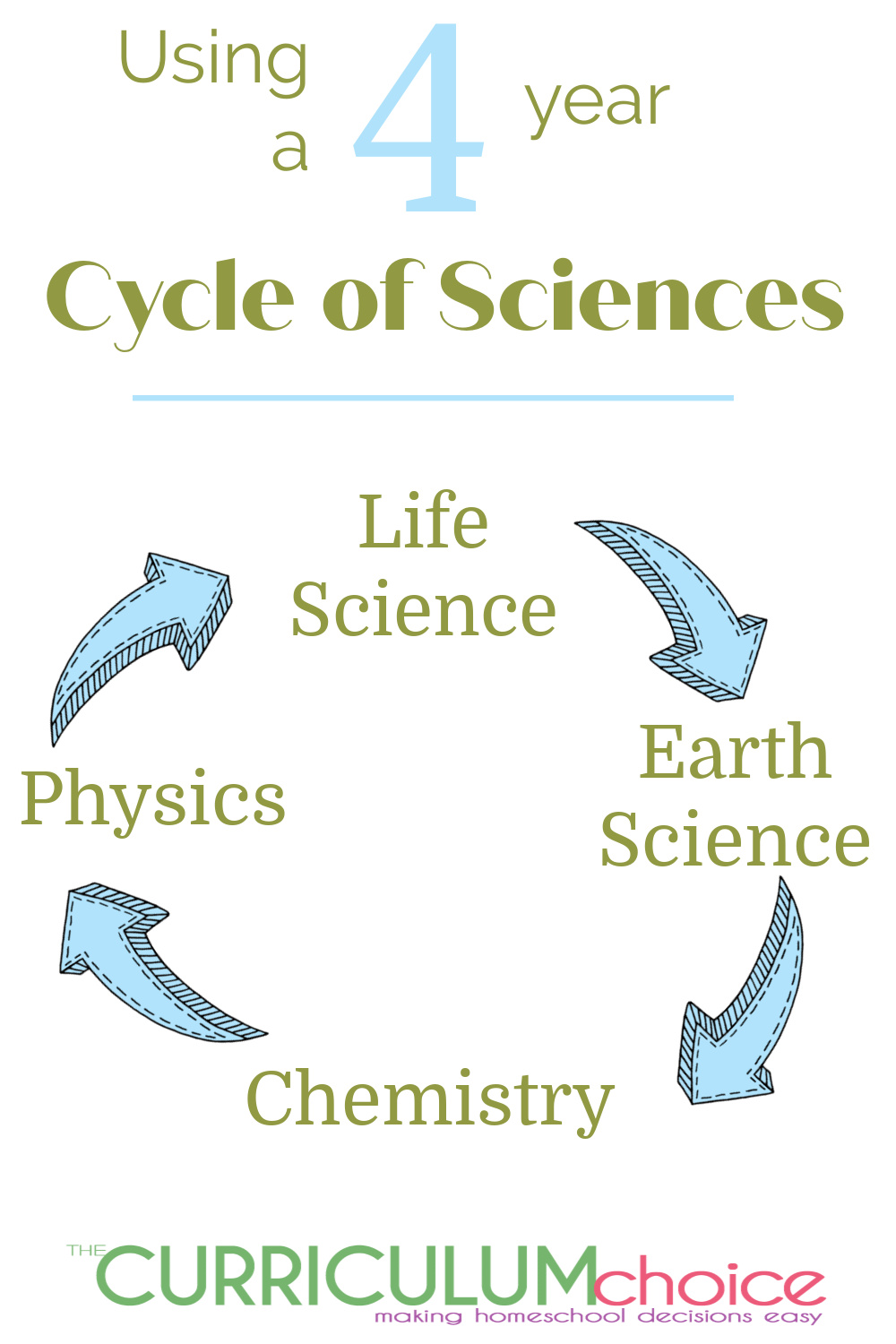
4 Year Cycle of Sciences
This concept of cycling through the sciences on a 4 year rotations comes from the Classical Education Model.
So for teaching science in your homeschool, you would follow this 4 year cycle, with each year focusing on a different field of science:
- 1. Life Science
- 2. Earth Science
- 3. Chemistry
- 4. Physics
Then you rinse and repeat, digging deeper into each discipline as you progress through the stages.
Why We Chose to Use a 4 Year Cycle of Sciences
Using a 4 year cycle of sciences has taken the guess work out of what our main science focus will be for a particular year.
Worried about teaching science this way?
If you are worried about learning how you were taught in school, with small segments of different sciences each year, I want to share with you what I learned. You can not get very in-depth with a particular subject if you are skimming the surface each year. But, to do a thorough study, depending on the age of your child, you are able to dig deeper and understand more. Plus, the child has time to get into what you are studying. Often when you study something for a few weeks, they are just really understanding it when you are done and ready to move on.
Naturally touching on other sciences…
The tricky year for me is the life science year. So, to be honest with you I have gone into the summer on that year and into a portion of the next year. If you are still worried about them getting bored, or them not learning a wide array of topics for that year, there are plenty of other opportunities to use other fields of scieance as you are teaching to one specifically. For example while teaching chemistry I have been able to also talk about physics, biology and earth science as we went very thoroughly through the periodic table and learned what each element was found in.
I don’t worry about missing something because I know that after the 4 year cycle of science we would have (theoretically) touched on all the sciences.
How we also were able to follow the kids’ interests in science:
I have children that took an interest in marine biology and now I send them to a marine biology camp during the summer, another child interested in robotics has a robotics camp to look forward to in the future. I also have one interested in archaeology and they ALL like to dig, so we are going on a local dig soon and on our next family vacation we are stopping to dig at a real site in VA, all day with a scientist. We also have started nature journaling which requires us to be outdoors observing each week and this will be an ongoing life science study for many weeks to come. So there are other times to pursue other science interests if we cannot “get to it” during our school time.
That’s what homeschooling is all about to me. It’s been a lifestyle change. We learn all the time, in everything we do. And while doing it, we enjoy each other’s company. If you are homeschooling for the long haul I would like to encourage you to keep some sort of cycle of the sciences. It lifts the burden of what to teach next and gives you the freedom to be creative within certain parameters.
Side note to moms not sure if you will homeschool next year: If you are not sure that you are able to homeschool for more then a year or two, I would stick with the traditional textbook style curriculum so that your child is not behind when they re-enter. That’s my opinion.
4 Year Cycle of Science – Resources for Each Cycle
I have broken down each of the 4 cycles with a brief description of what they cover and a collection of curriculum options to fulfill that cycle. Please note the * before many of the options. This denotes companies that offer more of the science cycles than just the one it is listed under.
1. Life Science
Life science is an enormous field of study that examines every living thing on earth. From bacteria to begonias to beluga whales, life sciences aim to learn everything about life on this planet.
Life science studies life in all its forms, past and present. This can include plants, animals, viruses and bacteria, single-celled organisms, and even cells. Life sciences study the biology of how these organisms live, which is why you may hear this group of specialties referred to as biology.
Life Science Curriculum Options
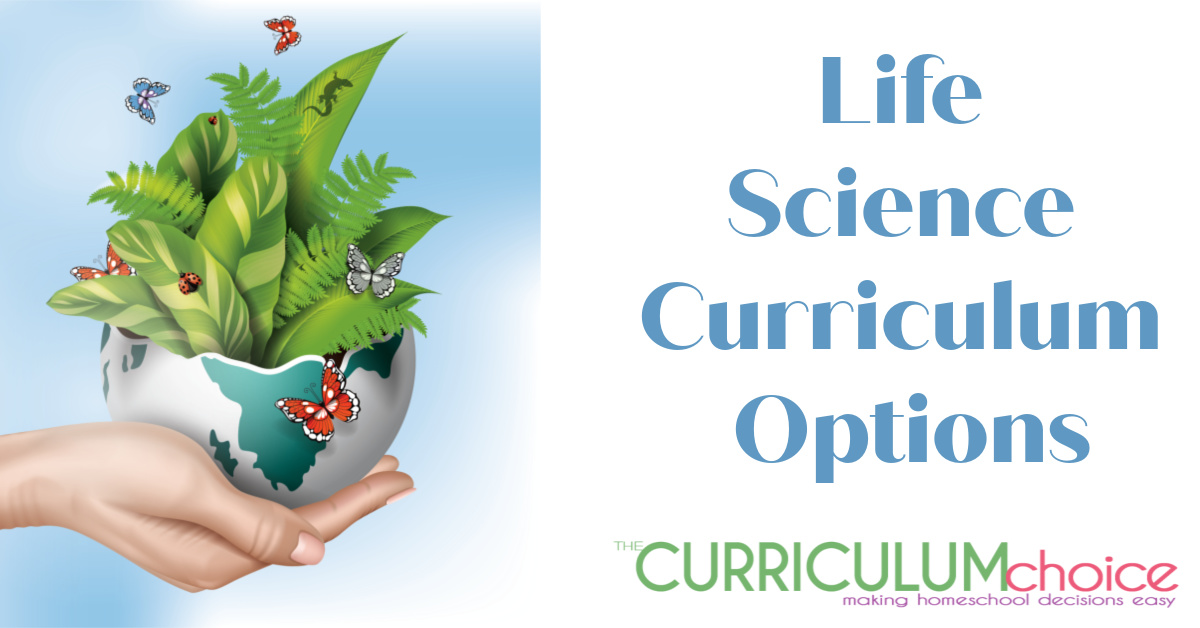
* Elemental Science Biology for the Grammar Stage – is a science curriculum made by a homeschooling mom. There is a Teacher’s Guide, a Student Workbook, and Quizzes. A classical approach using living books and reference books.
* Elemental Science’s Biology for the Logic Stage – you can see this science curriculum series is based on the Classical Education and Charlotte Mason methods. Biology for the Logic Stage is a 36 week classical science curriculum. It leads students through a study of plants, animal life, and the human body.
Botany in 8 Lessons – a complete curriculum for ages 8-14. A fun and comprehensive botany curriculum that offered detailed information in a flexible format.
* High School Biology for Your Homeschool with Apologia – a complete, Christian biology curriculum
Friendly Biology – opens the world of biology to high school students in a gentle, non-intimidating manner. Students are led through meaningful, well-written lessons and lab activities with the goal of attaining a greater respect for the beauty and complexity of living things.
* Fascinating Biology – uses an audio-visual technique to teach science in a step-by-step manner using plain English and clear illustrations. This “right-hemispheric” learning approach takes advantage of the brain’s ability to process images more efficiently and more effectively than just reading text. They have Biology, Chemistry, and Physics.
Homeschool High School Biology with PAC – is a high school level biology program that may be completed under the guidance of a teacher/parent, or through guided independent study with minimum student dependence on the teacher/parent.
Nature Study Made Easy with NaturExplorers Nature Unit Studies – 19 different, complete nature based science studies for 1st – 8th grades.
Compass Classroom’s Devotional Biology – Dr. Wise presents the lessons clearly and in in depth, with material that shows how actual science supports the Biblical creation account.
2. Earth Science
Earth science deals with any and all aspects of the Earth: its lands, interior, atmosphere, and oceans. The main branches are geology, meteorology, climatology, oceanography, and environmental science. Astronomy uses principles understood from Earth to learn about the solar system, galaxy, and universe.
Earth Science Curriculum Options
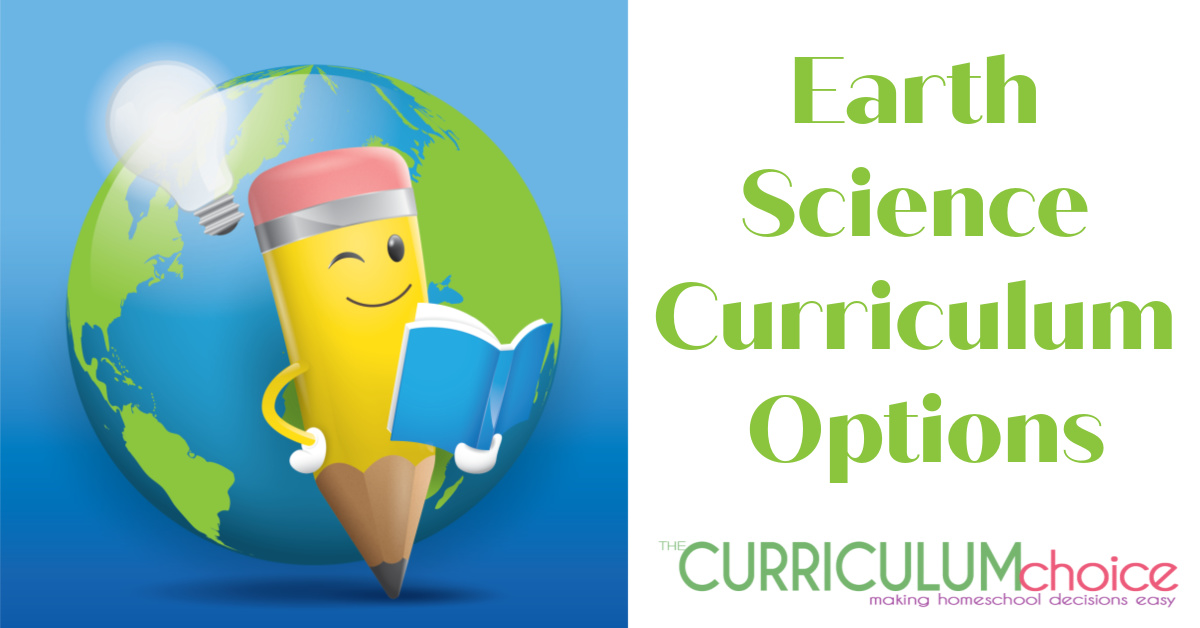
* Apologia Homeschool Earth Science Curriculum – for K-6th offers your child an opportunity to learn all kinds of awesome information about our earth. Plus, your child grows in wonder about the God who created it.
* Elemental Earth Science and Astronomy for the Grammar Stage – is a science curriculum made by a homeschooling mom. There is a Teacher’s Guide, a Student Workbook, and Quizzes. A classical approach using living books and reference books.
* Mr. Q’s Classic Science – is an affordable, non-religious, classically based science curriculum. Each curriculum (Life, Earth, Chemistry, Physical)covers a full year of science, broken down into 36 weeks. There are two different levels offered: An Elementary Level for ages 7-12 and an Advanced Level for high school aged students.
* Taylor Made Science – secular, lab-based science courses that promote science literacy and critical thinking skills. They offer live classes in Earth Science, Biology and Physics.
* BJU Press Earth Science – Two scientists-one portraying a secular, the other a biblical-perspective, will help to guide you through the text. Moving from the ground up, students will learn the history of the earth; the soil, rocks, and fossils; oceans, seas, lakes, and rivers; the atmosphere; and space.
* ABeka Earth and Space – explores the fields of geology, oceanography, meteorology, astronomy, and environmental science from a Christian perspective.
3. Chemistry
Chemistry is the branch of science that deals with the properties, composition, and structure of elements and compounds, how they can change, and the energy that is released or absorbed when they change.
In simpler terms, Chemistry is the branch of science that studies the properties of matter and how matter interacts with energy.
Chemistry is considered a physical science and is closely related to physics.
Chemistry Curriculum Options

Chemistry High School Curriculum for Homeschool – This is a MASSIVE article on chemistry for high school. Includes curriculum, outsourcing options, STEM activities an more!
* Apologia Exploring Creation with Chemistry – Check out the new 3rd edition and see why it’s so easy to implement in your homeschool.
Creative Chemistry for your Homeschool – fun ways to implement, focused science kits, and more!
Building a Solid Foundation in Chemistry with Home Science Tools – Hands-on science lessons with tools from Home Science Tools
* Exploring Creation with Chemistry and Physics from Apologia – part of their Young Explorer Series for kids in 5th and 6th grade.
* Fascinating Chemistry – uses an audio-visual technique to teach science in a step-by-step manner using plain English and clear illustrations. This “right-hemispheric” learning approach takes advantage of the brain’s ability to process images more efficiently and more effectively than just reading text. They have Biology, Chemistry, and Physics.
4. Physics
Physics is a science that deals with matter and energy and their interactions. In other words, Physics is a branch of science that helps us understand how objects, forces and energy all interact.
Physics Curriculum Options
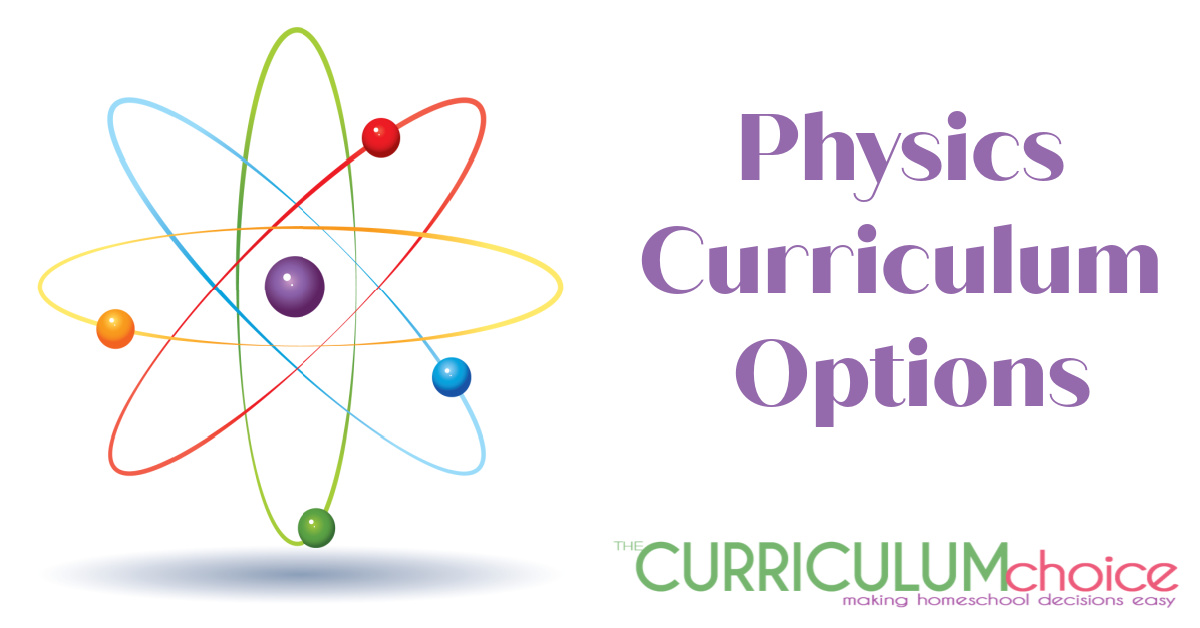
* Life Prep Physics – is from College Prep Science. They offer Christ-Centered Live & Self-Paced Online Classes for 4th – 12th Grade Homeschooled Students. (And YES there is a lab component option!) They also offer Biology and Chemistry.
* Mr. Q’s Classic Science – is an affordable, non-religious, classically based science curriculum. Each curriculum (Life, Earth, Chemistry, Physical)covers a full year of science, broken down into 36 weeks. There are two different levels offered: An Elementary Level for ages 7-12 and an Advanced Level for high school aged students.
* Fascinating Physics – uses an audio-visual technique to teach science in a step-by-step manner using plain English and clear illustrations. This “right-hemispheric” learning approach takes advantage of the brain’s ability to process images more efficiently and more effectively than just reading text. They have Biology, Chemistry, and Physics.
* Taylor Made Science – secular, lab-based science courses that promote science literacy and critical thinking skills. They offer live classes in Earth Science, Biology and Physics.
You Might Also Like:
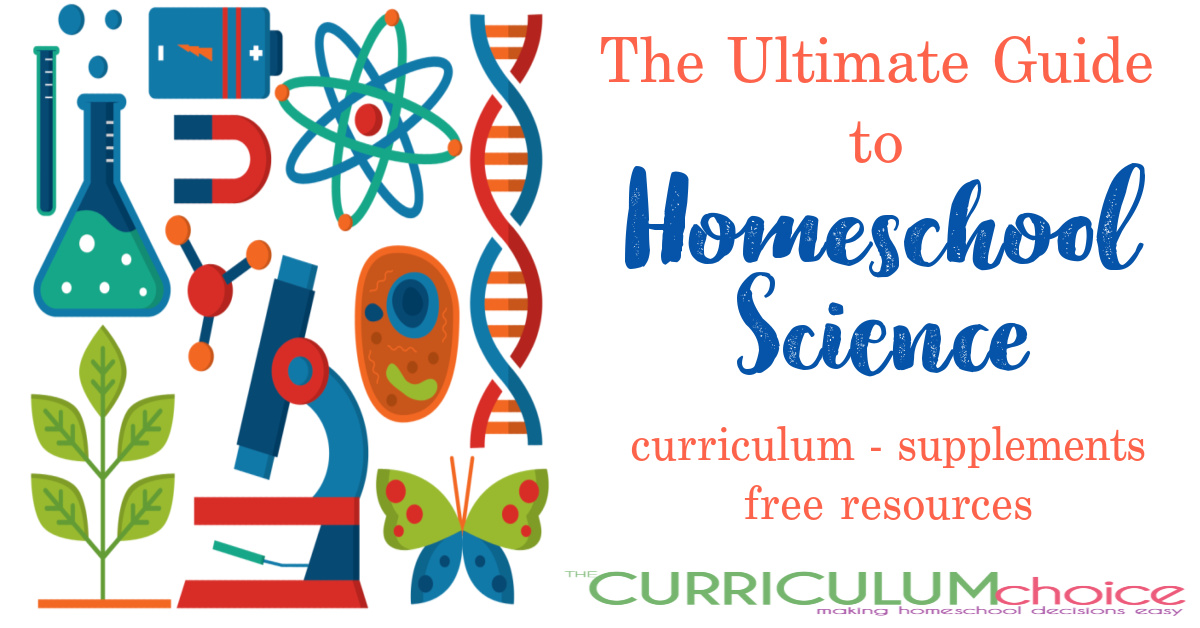
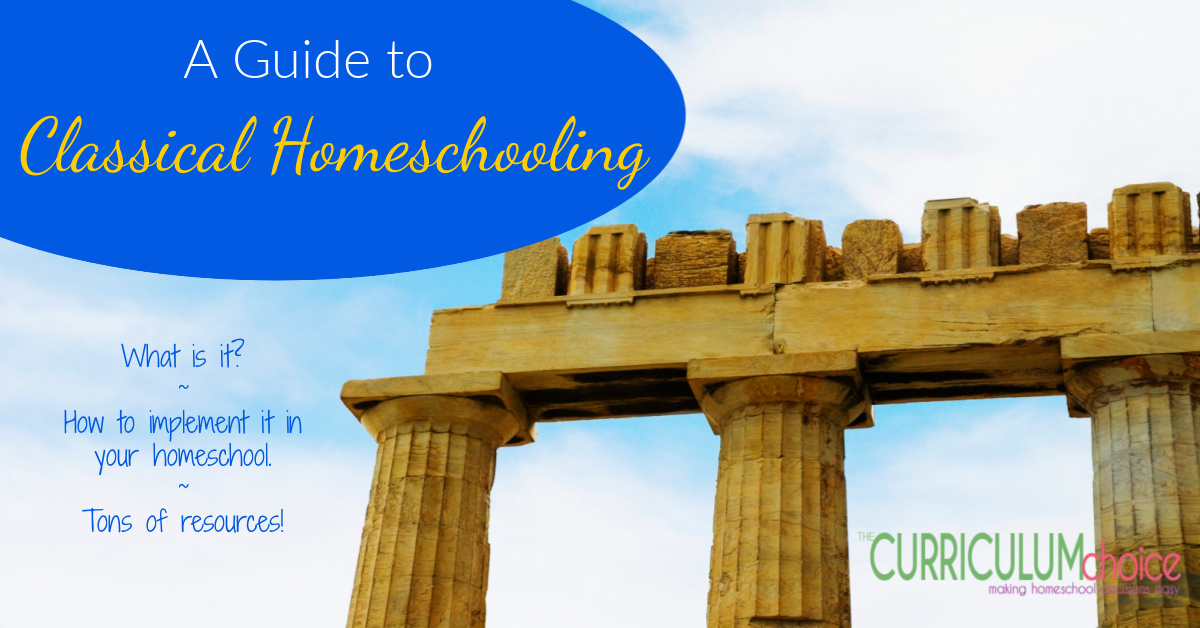
Originally posted April 2009, written by Brenda

My son just attended a camp in Rolla, MO that has a Jr. Vet Program. He loved it. Where is there a marine biology camp? That would be awesome to attend to. He is all about any kind of animal! I am a biologist and LOVE science. So glad my kids do to. It is my favorite to teach as it is so hands on.